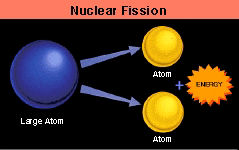
Fission

Nuclear
Fission involves the breaking up of large nuclei to smaller nuclei.
The most famous fission reaction is the chain reaction involving the
destruction of uranium-235. Your CD
has an interesting animation on this topic.
The
interesting thing about this reaction is that when a Uranium 235 is hit by a
neutron, it decomposes to a barium-139, a krypton-94 and three more neutrons and
a lot of energy. These three
neutrons can then go hit three more uranium atoms and a chain reaction has
begun.
You
can see this reaction at:
http://lectureonline.cl.msu.edu/~mmp/applist/chain/chain.htm
Fusion

Please go to http://www.jet.efda.org/pages/content/fusion1.html
to read about fusion.
Nuclear Fusion is the energy-producing process which takes place continuously in the sun and stars. In the core of the sun at temperatures of 10-15 million degrees Celsius, Hydrogen is converted to Helium providing enough energy to sustain life on earth.
For energy production on earth different fusion reactions are involved. The most suitable reaction occurs between the nuclei of the two heavy forms (isotopes) of Hydrogen - Deuterium (D) and Tritium (T); eventually reactions involving just Deuterium or Deuterium and Helium (3He) may be used.